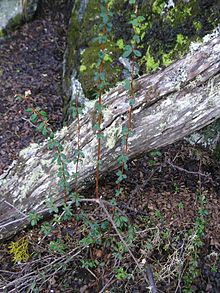Berberis microphylla (original) (raw)
From Wikipedia, the free encyclopedia
Species of plant
| Berberis microphylla | |
|---|---|
 |
|
| Calafate (Berberis microphylla) | |
| Scientific classification |
|
| Kingdom: | Plantae |
| Clade: | Tracheophytes |
| Clade: | Angiosperms |
| Clade: | Eudicots |
| Order: | Ranunculales |
| Family: | Berberidaceae |
| Genus: | Berberis |
| Species: | B. microphylla |
| Binomial name | |
| Berberis microphyllaG. Forst. 1789 | |
| Synonyms[1] | |
| Berberis antucoana C.K.Schneid. Berberis barilochensis Job Berberis buxifolia Lam. Berberis cristata (Lam.) Lavallée Berberis cuneata DC. Berberis dulcis Sweet nom. illeg. Berberis heterophylla Juss. ex Poir. Berberis inermis Pers. Berberis magellanica Dippel Berberis marginata Gay Berberis minor J.R.Forst. ex DC. Berberis morenonis Kuntze Berberis parodii Job Berberis rotundifolia Lindl. nom. illeg. Berberis spinosa Comm. ex Decne. Berberis spinosissima (Reiche) Ahrendt Berberis tricuspidata Sm. ex DC. |
Calafate flower
Berberis microphylla, common name box-leaved barberry[2] and Magellan barberry,[3] in Spanish calafate and michay and other names,[4] is an evergreen shrub, with simple, shiny box-like leaves. The calafate is native to southern Argentina and Chile and is a symbol of Patagonia.[5][6][7][8][9][10] Berberis microphylla should not be confused with Mahonia microphylla, native to China.[11]
The bush grows to a height of 1.0 to 1.5 m (3 ft 3 in to 4 ft 11 in). It has many arching branches, each covered in many tripartite spines. The bush has many small yellow flowers in summer. It produces blue-black berries.
Fruits in spring
Its edible blue-black berries are harvested for jams, but are eaten fresh too - a legend tells that anyone who eats a calafate berry will be certain to return to Patagonia.[12] It is also used as an additive in alcoholic beverages such as calafate beer.[13]
The calafate is grown commercially for its fruit, potential medical uses[3] and as a garden plant or bonsai. Its wood is used to make a red dye. The cultivar Berberis microphylla 'Nana' is widely available as a garden shrub, and is also used in commercial plantings as a low spiny hedge to discourage intruders, but it does not fruit.[14]
- ^ The Plant List: A Working List of All Plant Species, retrieved 3 January 2016
- ^ BSBI List 2007 (xls). Botanical Society of Britain and Ireland. Archived from the original (xls) on 2015-06-26. Retrieved 2014-10-17.
- ^ a b Plants for a Future entry for Berberis buxifolia Lam., retrieved 3 January 2016
- ^ Berberis microphylla at FrutasdelBosque (in Spanish)
- ^ Ahrendt, L. W. A. (1961). Berberis and Mahonia. A taxonomic revision. J. Linn. Soc., Bot. 57(369): 1–410.
- ^ Landrum, L. R. 1999 [2000]. Revision of Berberis (Berberidaceae) in Chile and adjacent southern Argentina. Ann. Missouri Bot. Gard. 86(4): 793–834.
- ^ Hoffmann, A. (1982). Flora silvestre de Chile zona araucana. Edición 4. Ediciones Fundación Claudio Gay, Santiago, Chile. 258p.
- ^ Landrum, L. R. (2003). Berberidaceae. En C. Marticorena y R. Rodríguez [eds.], Flora de Chile Vol. 2(2), pp 1–23. Universidad de Concepción, Concepción.
- ^ Marticorena, C. & M. Quezada. (1985). Catálogo de la Flora Vascular de Chile. Gayana, Bot. 42: 1–157.
- ^ Zuloaga, F. O. (1997). Catálogo de las plantas vasculares de la Argentina. Monogr. Syst. Bot. Missouri Bot. Gard. 74(1–2): 1–1331.
- ^ Flora of China Vol. 19 Page 778 小叶十大功劳 xiao ye shi da gong lao Mahonia microphylla T. S. Ying & G. R. Long
- ^ "El que come calafate ha de volver". Patagoniachilena.com (in Spanish). Archived from the original on 2011-06-05.
- ^ Lemoine, María Laura; Fontana, Ulises; Hurtado, Jazmín B.; Pintos, Federico M.; Arena, Miriam E.; Vicente, Ariel R.; Rodoni, Luis M. (2021-12-16). "WILD BARBERRY FRUIT (Berberis microphylla G. Forst.) AS A NATURAL INGREDIENT FOR BEER BREWING". Chilean Journal of Agricultural & Animal Sciences. 37 (3): 313–324. doi:10.29393/CHJAAS37-32WBML70032. hdl:11336/164839. ISSN 0719-3890.
- ^ "Berberis heterophylla". Germplasm Resources Information Network. Agricultural Research Service, United States Department of Agriculture. Retrieved November 17, 2007.


